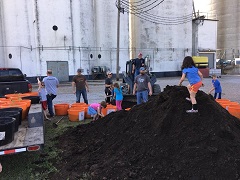May 15, 2018
Who Does Community Vitality Work in Cherokee County? We All Do!

Dale Helwig leads a team of agents and office professionals who see “community vitality” as central to everything they do. With only 20,000 residents, the community needs each person to participate in order to thrive. Helwig has been with Extension for less than five years. As a cattle producer he used Extension Ag resources and served on the Extension board. Christina Holmes, FCS agent, is a registered dietician who says, “I spent years as a hospital dietician putting Band-Aids on chronic diseases, primarily diabetes.” Holmes is grateful for the opportunity to work proactively in changing health habits as an Extension agent. The 4-H agent, Katrina Elliott, joined Cherokee County within one week of Holmes, in October 2015. Katrina is a recent OSU graduate who taught for one year in Oklahoma before coming to Cherokee County Extension. Megan Bevans and Julie Thomas are called program assistants instead of office professionals because they are just as much part of the action as any agent.
Holmes says, “Cherokee County has one of the highest obesity rates in the state so I develop lots of youth and family programming to encourage better habits.” Their work is informed by data about food access, food desserts, the significant number of people without transportation and the best practices for changing these conditions. They work hard to include the non-traditional voices: people in poverty, those with mental illness and the elderly.
When the agents talk about what they do, they automatically talk about their partners. Helwig says, “By being present at the Chamber meetings, Commission meetings, schools and community coalitions, we can encourage their work and be a resource.” The work Extension does in the schools is an entry point for many people, as well as programs and partnerships.
The school community garden was started by a teacher, but KSRE was a natural partner in creating lessons to build on what the children were learning in the garden.
Elliott emphasized, “We like to plan a series of programs, rather than a ‘one and done’ so that the learning builds on each other. It usually incorporates each of our areas of expertise.” The Farm to Fork lessons incorporated five lessons on tomatoes including Tomato Growth and History; Nutrition; Making Tomato (pico de gallo) Snacks; The Role of Bugs, Worms and Bees; and the Water Cycle. An activity in every lesson reinforces learning. The school partnerships were so successful, they were featured by Dean Floros in the Health “Grand Challenge” video. Adam Thomasson, Assistant Principal at Riverton Elementary says, “The kids love it… it’s hands on, it’s engaging. I’m a firm believer that when kids are engaged in school, when they have a connection to school, attendance improves, grades go up, behaviors drop. The teaching is relevant… it’s lifelong learning.”
That’s a long-term community vitality outcome Cherokee County and KSRE staff are striving for—connection with school and community.
Each agent is keenly aware that one outcome builds on the other, leads to new projects and greater success.
Extension is working with Columbus PRIDE, an existing group that had gotten a little stagnant. The group reported what was getting done (a tree planting at the park or the school) instead of being proactive and responding to needs. Recently PRIDE decided to do a project to provide fresh produce to residents who are not able to utilize the community garden because of health issues or transportation limitations. They used recycled feed and mineral tubs as containers. So many farmers have the tubs stacked in hedge rows that they had no shortage of offers; one farmer gave 94! The Farmers Co-op donated soil. PRIDE and Extension staff wondered if they would have enough volunteers to help, but they put it out to their school partners and into Facebook and 50 volunteers showed up to work, including people they never would have expected to volunteer. Their kids brought them. The kids knew Extension staff from school and didn’t want to be left out of the project. They expect to deliver 144 tubs to 72 residences. The photos tell a great story on the “Cherokee County K-State Research and Extension” and “The Columbus Project” Facebook pages.
Helwig is a regular participant on the KSRE First Friday e-calls and has introduced Liz Simpson, a Community Development Specialist from Crossland to the calls. Simpson says, “Crossland Construction started in Columbus in 1977 in Ivan Crossland’s garage. We have more than 1500 employees in 37 states but we will always be in Columbus, Kansas.” The company achieved $1 Billion in revenue last year, but Simpson is certain that they can’t be successful without a skilled workforce and a vital community.
Christina Holmes has worked with Simpson on child care initiatives and exploring empty building surveys and Block 22 Grants. Simpson says, “The more we work and talk together, the more successful we will be at creating community bonds and drawing other people here.”
Cherokee County Extension doesn’t let a lack of funding stop them. Recently the public library approached the office to work on a family and child activity that will incorporate making “Blessing Boxes” for the 5 wards in Columbus. Helwig says, “We don’t know where the funding will come from, but our experience is that when you have a plan that inspires people, the money or the resources show up.”